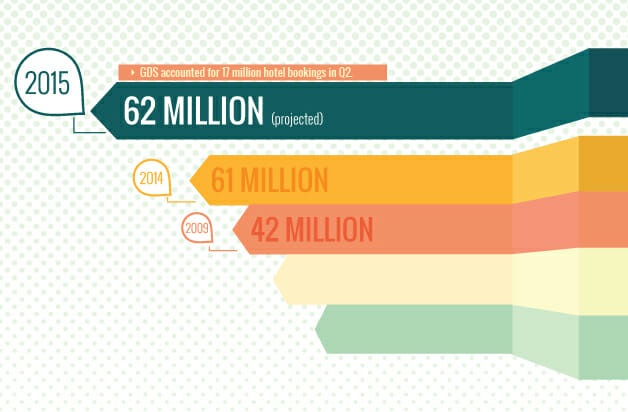
Hotel bookings through travel agents are expected to reach a record high in 2015 and have held their share of the market despite dire predictions for years.
REPORT FROM THE U.S.—It’s easy to fixate on technology when talking about bookings, but one of the most well-established paths to booking a room might represent the most overlooked opportunity for hoteliers. That opportunity? Global distribution systems.
Recent global data released by TravelClick projects 2015 to be a record year for bookings through global distribution systems, the channel used when guests book through traditional travel agents. TravelClick is projecting 62 million bookings through GDSes in 2015, which is up from 61 million in 2014 and 42 million during the depths of the recession in 2009.
According to the data, a total of $12 billion in revenue was booked across all channels in the second quarter in the top 50 global markets, encompassing 69 million roomnights. GDS bookings covered 16.3% of those bookings. The highest portion of bookings came through direct bookings (36.9%), followed by Web bookings (22.5%). Central reservations system bookings (12.8%) and OTA bookings (10.2%) represent the remaining portion.
GDS bookings have managed to hold their share of transient bookings through the past two years, staying steady at 19.1% during the second quarter of each year. The total revenue from transient bookings in the top 50 markets during the second quarter grew year over year from $11.5 billion in 2014 to $11.8 billion this year.
During a recent webinar on the data titled “Second quarter 2015 global hotel industry update,” John Hach, senior industry analyst for TravelClick, said that piece of the pie is up for grabs for enterprising hoteliers because many have ignored the segment and assumed for years that travel agent bookings are bound to decline.
“The hotels that get this business are the ones who understand it and actively market themselves,” Hach said. “Only about 10% of those connected to travel agents actively market to them. That number is so low because people believe that business is going through other channels.”
David Burke, executive VP and chief sales and marketing officer for the Breakers Palm Beach, told Hotel News Now that bookings through travel agents represents roughly 15% of his resort’s leisure travel, which has remained steady despite dire predictions.
“We’ve been hearing predictions about the demise of travel agencies for years, and it never really happened,” Burke said.
Burke said not only are those bookings steady, but they represent some of the most profitable guests for the hotel.
“They trend higher than most guests, spending more on suites or to stay on the concierge floor,” Burke said. “And the high spending isn’t just on the room rate; it’s the total spend.”
That is supported by TravelClick data, which showed GDS bookings captured the highest ADR among the five segments tracked both internationally (€198, or $222) and in North America ($189).
Burke said getting in on travel agent bookings isn’t particularly complicated work.
“It’s not rocket science,” Burke said. “It’s about relationships.”
Mobile booking is not a prediction; it’s reality
If you aren’t ready for mobile booking, then you’re already behind the curve, Hach said.
“Not having a mobile-optimized site today is like not having a website in 2002,” Hach said. “Having an optimized site is a great way to find a local hotel on short notice. We’re starting to see this shift, and it’s becoming apparent. It’s a big change in consumer behavior.”
Web bookings, including those made through mobile apps and responsive websites, represented 27.7% of transient reservations in the second quarter of 2015. That’s up from 26.3% in the second quarter of 2014.
Alexis Welner, senior director of global enterprise business intelligence for TravelClick, said during the webinar that the trend toward more mobile booking has been a long time coming.
“We’ve been talking about this for years and years and years, but the proof is in the data,” Welner said.
Sam Trotter, director of development and portfolio e-commerce manager for Boutique Hospitality Management, told HNN that dealing in mobile has become a regular part of doing business at his company.
“Everything we do now has to be mobile-friendly,” Trotter said.
He said that effort pays off in multiple booking channels.
“Unfortunately (mobile) doesn’t convert as well as on desktop, so we make it as easy as possible to call the reservation department (from the mobile site) instead of making people clumsily use their thumbs,” Trotter said.
